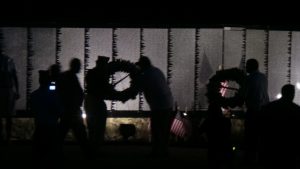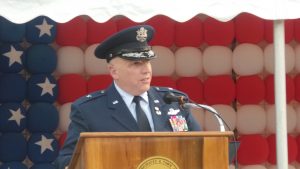Fighting for Veterans
 The brave members of our armed forces and their families make sacrifices, serving our country to protect freedoms across the world. As a state representative and an American who is grateful for veterans’ contributions to protecting peace and freedom, Rep. Stanley works ensure our veterans and their families are supported in every way possible.
The brave members of our armed forces and their families make sacrifices, serving our country to protect freedoms across the world. As a state representative and an American who is grateful for veterans’ contributions to protecting peace and freedom, Rep. Stanley works ensure our veterans and their families are supported in every way possible.
Since taking office, Rep. Stanley has worked side-by-side with House members of the Joint Committee on Veterans and Federal Affairs to support and protect initiatives and services for our veterans. Rep. Stanley and his colleagues in the House are committed to ensuring that Massachusetts remains number one in the nation in providing services to our veterans.
As a member of the Way & Means Committee, Rep. Stanley supported a state budget which includes:
- $77.43 million in chapter 115 benefits for cities and towns a $6.46M increase since FY14
- $250,000 for the train vets to treat vets program
- $350,000 to train veteran service officers (VSOs)
- $3.66 million for veteran outreach centers
- $2.9 million to help combat veterans homelessness
 Rep. Stanley and his colleagues in the House unanimously passed “An Act Relative to Housing, Operations, Military Service, and Enrichment” (HOME Act). Building on the successes of the Valor Act I passed in 2012 and the Valor Act II passed in 2014, the HOME Act provides important benefits to veterans and their families in terms of employment, housing, property tax relief, education and other services.
Rep. Stanley and his colleagues in the House unanimously passed “An Act Relative to Housing, Operations, Military Service, and Enrichment” (HOME Act). Building on the successes of the Valor Act I passed in 2012 and the Valor Act II passed in 2014, the HOME Act provides important benefits to veterans and their families in terms of employment, housing, property tax relief, education and other services.
- The bill establishes the Office of State Veterans’ Homes and Housing which will advise the Department of Veterans’ Services and provide oversight for the Commonwealth’s two soldiers’ homes in Chelsea and Holyoke
- The bill creates an Executive Director position to head the new office – the Executive Director will focus on long-term care and will be responsible for the coordinated implementation and enforcement of laws, regulations and policies
- To increase access to housing for veterans, the bill grants veterans preference in admission for scattered site housing units where no low-income family housing has been developed
- The bill also requires housing authorities to exclude amounts of disability compensation paid by the federal government when computing rent for a disabled veteran
- In addition, the bill gives eligible veterans a preference in elderly and disabled housing in all communities, not solely the community in which the veteran resides
- The bill provides a property tax exemption for the surviving spouse of any veteran or service member who, during active duty, suffered an injury or illness which led to his or her passing.
Other provisions of this legislation include:
- The expansion of the Public Service Scholarship to children of any military or service person missing in action or prisoners of war
- Allows employees of the Commonwealth who are members of the armed forces reserves and are ordered to service for more than 30 consecutive days to be paid the regular base salary reduced by the amount received as base pay for military service. It also preserves the seniority and accrued leave time the veteran has earned prior to their deployment
- Allows cities and towns to appoint a veterans agent for up to 3 year terms instead of the current 1 year term
- Extends the Veterans’ Long-term Care Commission and reworks the Post-Deployment Council, both of which were created through the 2014 VALOR Act and focus on housing and support services for veterans transitioning from active duty to civilian life
- Adds veteran status as a protected class under the statute prohibiting discrimination in employment
- Allows municipalities to create a voluntary check off box to donate money to a municipal veteran’s assistance fund to provide support for veterans and their dependents in need of immediate assistance with food, transportation, heat, and oil expenses
- Provides excise tax exemption for veterans while deployed
- Extends assistance from the Military Relief Fund to service members whose death was related to their military service. Previously the Fund was only for service members killed in action
- Businesses with more than fifty employees must grant veterans a paid leave of absence on Veterans Day
- Prohibits municipalities from transferring the right to receive debt payments if the municipality receives notice that the debtor is a veteran
- Expands eligibility for Gold Star Family license plates, and establishes Bicentennial Park in Fall River as the Gold Star Families Memorial Monument of the Commonwealth
- Instructs the departments of veterans services to study the implementation of a sliding scale property tax abatement for disabled veterans, costs of transporting incarcerated disabled veterans to VA medical facilities, and the implementation of tax rebates for veterans who lease dwellings to veterans.
Previously, Rep. Stanley has filed legislation and voted in support of omnibus bills known as the Valor Act I and II, some of the most comprehensive and innovative legislative changes to support and expand services for military personnel, veterans and their families. These bills provide business opportunities, school services, employment education and health care support services to our state’s veterans and families.
The VALOR Act II included the following provisions:
- Allows students currently enrolled in college, who are called to active duty, to either complete their coursework without penalty following duty, or to withdraw and receive a tuition refund;
- Increases penalties for disturbing military funerals or services;
- Enacts provisions to guard against charity fraud;
- Requires the Division of Professional Licensure to waive the initial application or certification fee for licensure for any veteran;
- Establishes a post-deployment council to make recommendations and study mental health issues to support military members transitioning to civilian life after deployment;
- Requires the Department of Public Health to issue guidance to acute hospitals and ambulance service providers to ensure the identification of veterans in emergency settings.